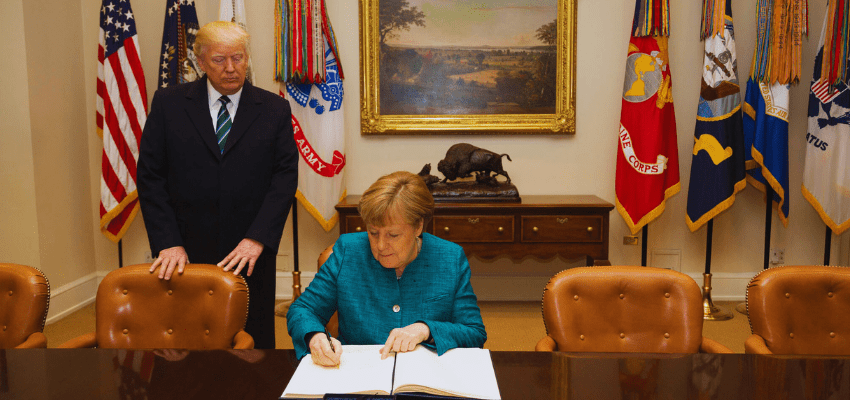By Richard Cohen, March 3, 2025
At the 2008 NATO Summit in Bucharest, Angela Merkel blocked an invitation to Ukraine and Georgia to join the alliance – a tragic decision that has since cost hundreds of thousands of lives during Russia’s war of aggression against Ukraine.
I attended that summit and remember seeing the German Chancellor in the next room – a tiny figure surrounded many of the other Allied leaders who were trying to persuade her to change her mind. Merkel held firm, and in keeping with the NATO rule of consensus (which, in NATO, means unanimity) the alliance issued a watered-down declaration affirming that “…these countries (Ukraine and Georgia) will become members of NATO… .” But only at some undefined and far-off date.
In retrospect, NATO’s decision not to welcome Ukraine and Georgia into the alliance was a huge mistake. Russian reaction would no doubt have been heavy on rhetoric, but likely light on action. Had those invitations been extended, Europe, and the world, would be a different place in 2025.
A lot has happened between then and now. And in the years that followed that fateful NATO meeting, Frau Merkel, absolutely convinced of the correctness of her policy of accommodating Russia, put Germany, the rest of Europe, and most of all, Ukraine, into increased peril. Despite warnings from advisors, at home and abroad, the then-almost universally admired German Chancellor massively increased her country’s reliance on Russian energy. She was convinced that strengthening economic ties with President Vladimir Putin’s Russia was the best way to avoid future conflict.
In 2014, after Putin’s seizure of Crimea and parts of eastern Ukraine, Merkel became one of the chief architects of the ill-fated Minsk Agreements. They promised “Restoration of full control over the state border of Ukraine by Ukraine’s government throughout the whole conflict area… by the end of 2015… .” Of course, that never happened. But as an attempt to satisfy Putin and to stabilize the situation, the Minsk Agreements effectively ceded Crimea and parts of eastern Ukraine to Russia. Clearly Putin was not satisfied.
Since the full-fledged Russian invasion of Ukraine in February 2022, Germany has emerged, under different management, and reluctantly at first, as one of the leading political, military, and financial backers of Ukraine. Gone, and largely forgotten, are the failed policies of the former chancellor that in many ways helped to bring us to the current crisis. Now Merkel’s political successor, the newly elected Friederick Merz, is faced with the irony of a US president who holds the same absolute conviction about Putin’s reasonableness and desire for peace, as did his predecessor.
Trump, in his first iteration as American president, was no great fan of Merkel. He reportedly called her “stupid,” and she pointedly remarked that “You can’t chat with him. Every meeting is a competition.”
The irony is that Trump, at the start of his second term in office, is following the same Merkel policy of appeasement that has brought us to the current dangerous impasse. Trump is as convinced, as Merkel once was, that he knows best.
They say history does not repeat itself, but it certainly can teach lessons. Apparently, Trump is not interested in history, except when he tries to rewrite it. Trump has claimed repeatedly that if he had been president in 2022, the invasion of Ukraine would not have happened. Several European leaders, including President Emmanuel Macron of France, announced in the weeks prior to the invasion that their talks with Putin had avoided a war. But even Merkel knew by the end of her time as chancellor, in December 2021, that “for Putin, only power counts.” And he believed that neither the Europeans nor the Americans had the will, nor the power, to stop him.
What is different today? Amongst the whirlwind of changes that surround Trump’s first few weeks in office, a quick settlement to the war in Ukraine looms large. If he was not able to stop the war in 2022, he feels he can now bring it to a quick finish in 2025. Trump seems willing to give Putin at least the gains he’s made so far, at great cost to both sides; some 20 per cent of Ukrainian territory, plus an assurance that Ukraine will never become a NATO member. Trump believes that he can do this without the participation of the Ukrainians or their European allies, whom he thinks will only complicate the process and steal some of the credit for a settlement.
The US President says he trusts Putin, despite overwhelming evidence to the contrary. But Putin’s previous promises were to others… not to Trump, the consummate dealmaker. Angela Merkel, in her more modest way, believed the same. And look where we are now.
Richard Cohen is a former Canadian and British Army officer. He founded and led NATO’s military co-operation program with the countries of the former Soviet Bloc, and was professor of European security and NATO studies at the George C. Marshall European Center for Security Studies. From 2007–2011, he was senior defence advisor to the minister of national defence.






